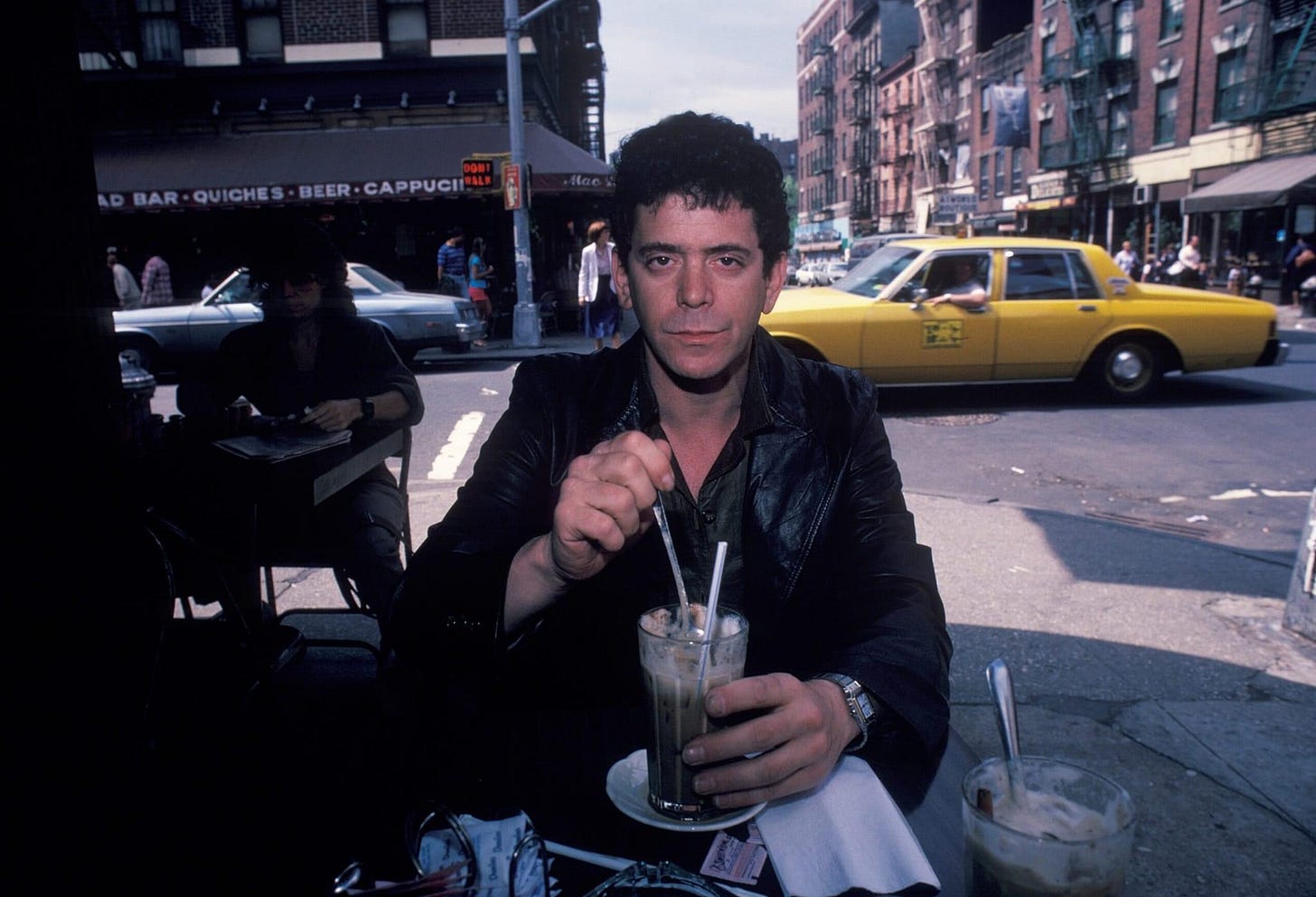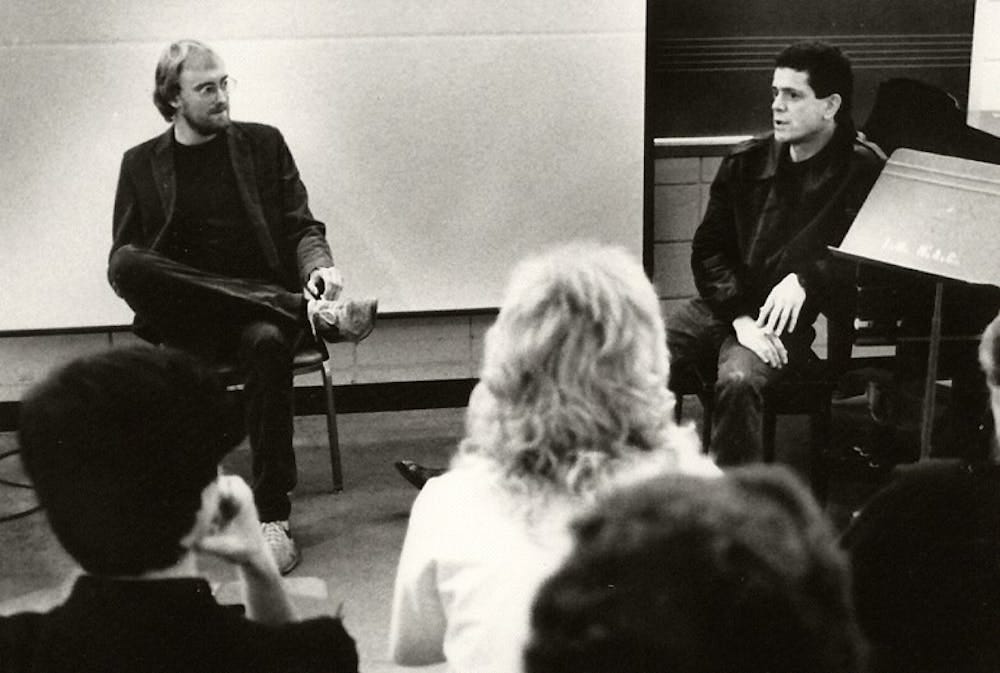
The person I know who I most associate with Lou Reed is my friend Tyler. His email handle for as long as I’ve known him is ILoveLouReed3242.
He’s one of the people I’ve known longest, one of the first people to talk to me after I moved schools in the middle of the year in 7th grade.
While we were friendly, I don’t know if we really became friends until 2016. I think we recognized aspects of ourselves in each other, a dynamic which can lead to great friendships or great acrimony.
Frank Zappa and Lou Reed fell into the latter category, and while I wouldn’t characterize the relationship as friendly, there was grudging respect on at least one side of the conflict.
The casus belli dates back to 1966 when they were both signed to the same label and the driving force of an avant-garde rock group.
After a performance in Los Angeles by The Velvet Underground as part of Andy Warhol’s The Plastic Exploding Inevitable. Zappa, never shy about criticizing his contemporaries, made a sarcastic remark about the band.
Reed responded in the pages of a magazine, “Frank Zappa is the most untalented musician I’ve ever heard. He’s two-bit, pretentious, academic, and he can’t play his way out of anything. He can’t play rock’n’roll because he’s a loser. And that’s why he dresses up funny. He’s not happy with himself, and I think he’s right.”
The similarities between them were ultimately what set them against each other; familiarity breeds contempt. Both were born on the East Coast to white ethnic families: Zappa in Baltimore to Italian and French parents, Reed in New York to Russian Jewish parents. And as Tony Soprano said of Italians in “Second Opinion,” an episode written by Jewish screenwriter Lawrence Konner, they’re “Jews with better food.” I have found that observation to ring true, not necessarily from the culinary angle – I have a deep love for Jewish delis – but from a behavioral standpoint. Talking loudly, interrupting, and gesticulating while doing so is perfectly normal for Jews, Italians, and similar cultures. We understand one and other on some level because of that.
Doo-wop was a shared early musical love, Zappa recorded a whole doo-wop album, Reed named one of his albums after a doo-wop song and some of the earliest music he performed was doo-wop. They had an appreciation for the experimental in music, noise played a role in their music at various points Literature influenced their songwriting, a Kafka short story inspired at least one Zappa song and poet Delmore Schwartz was an early mentor of Reed’s when he was attending Syracuse University.
The release of their debut albums – both produced by Tom Wilson– sparked the feud. Release of The Velvet Underground & Nico was delayed for a year for reasons related to the album packaging. A photo featuring Eric Samson was on the back cover and he threatened to sue for unauthorized use of his image.
The Velvets felt that Verve was throwing more promotion money behind Zappa because they could rely on Andy Warhol to promote the group.
The feud continued into the 70s. During a performance at the Rainbow Theatre in London, Zappa was attacked by an audience member. Trevor Howell pushed Zappa off the stage and he hit the concrete floor of the orchestra pit.
The fall left Zappa severely: injured, he had multiple fractures, trauma to the head, his back, neck and a leg were hurt, and his larynx was crushed, changing his vocal range.
Lou Reed later booked shows at the Rainbow because he wanted to be able to look down from the stage and see the spot where Frank Zappa nearly died.
“I enjoyed those shows. I kept thinking, Frank Zappa fell seventeen feet down into that pit. I hate Frank Zappa, and it made me so happy to think about that!"Reed said.
The feud was squashed for good when Reed inducted Zappa into the Rock & Roll Hall of Fame.
“It's very rare in life to know someone who affects things; changes them in a positive way. I've been lucky enough to have known some in my life: Andy Warhol, Doc Pomus People whose vision and integrity was such that it moved the world a bit. People who, through the articulation of their talents and intelligence, were able to leave things better than they had found them. People who were not only not in it for the money, to paraphrase Frank Zappa. Frank Zappa was such a person and of the many regrets I have in life, not knowing him a lot better is one of them.
Whether writing symphonies, satirical broadsides or casting a caustic glow across the frontier of madness that makes up the American political landscape; whether testifying before Congress to put the PMRC in its rightful lowly place, or acting as a cultural conduit for President Vaclav Havel and the Czech government, Frank was a force for reason and honesty in the business deficient in those areas. As we reward some with money for the amusement they supply to the cultural masses, I think the induction of Frank Zappa in the Rock and Roll Hall of Fame distinguishes the Hall as well as the inductee.
Musicians usually cannot speak. That's why they communicate through their instruments. But Frank was one who could. And because music is pure, the musician is pure as well and when Frank spoke he demonstrated the power of purity. Who will do that now? I admired Frank greatly and I know he admired me. It gives me great pleasure to give this award to his daughter, Moon Zappa.”
When we truly became friends, we met in the middle: he’d become less abrasive and I had grown a thicker skin. We understood each other as only two socially maladjusted people could.
We saw in the other someone else with the same passion for music and a similar ability to retain that information. And while I studied musicology, Tyler has forgotten far more about music than I know. Sometimes when talking about us, he describes us both musicologists: one self-taught and the other with conservatory training.
I have source amnesia for where I first heard about The Velvet Underground but Tyler is the first person I knew who championed them.
After becoming acquainted in seventh grade, we didn’t really spend much time with each other until we were both sophomores and in a higher-level English class. If you are ever fortunate to spend time with Tyler, you’ll instantly be aware of his keen wit, vast knowledge of music, film, beer, vintage video games and many, many other topics.
His self-applied title of The Master of Conversation rings incredibly true when you spend anytime around him. He has a real knack for connecting with people and striking up great discussions with the people he encounters on his travels around the country. To observe that in person leaves one in a state of awe. Tyler has a knack for coining phrases that describe something so well that any other term falls short of the truth.
A favorite of mine is his descriptor for a particularly awful beer. His reasoning is that if Dog Fish Head represents the pinnacle of craft brew for many people, then Dog Shit Head is the nadir. It’s a beautiful turn of phrase: allusory and succinct. Sally can't dance no more/They found her in the trunk of a Ford.
In terms of sheer knowledge retention, Tyler is one of the most brilliant people I have ever met. Half the fun of being his friend is riffing with him, each trying to outdo the other in terms of jokes and obscurity of allusions.
When studying Poe, each of us brought a beloved piece of pop culture to the table: The Simpsons for me and Lou Reed for him. I don’t recall if we watched “The Raven”segment of “Treehouse of Horror,” but we did watch “Time and Punishment” when reading “A Sound of Thunder.”
Tyler convinced our teacher to play Lou Reed’s version of “The Raven”, narrated by Willem Dafoe and featuring some new additions to the poem. The line “I smoke and smoke the blue vial's glory” comes to mind.
I didn’t start listening to Reed until late in high school when I picked up The Very Best of the Velvet Underground. I felt a little intimidated to crowd in on Tyler’s territory.
In college, they became a regular part of my listening, and I explored Reed and John Cale’s solo work. Listening to Transformer brings me back to my mother dropping off near my Finite Mathematics class after a weekend at home. “Andy’s Chest” is what I heard while trying to find my seat.
One of my suitemates had a similar affinity for music and I remember one day he played “Sister Ray” on YouTube. It was split into multiple parts because at that point videos could only be a maximum of ten minutes. “Sister Ray” was nearly twenty minutes long. In those days, it was more difficult to hear music on demand if you didn’t own it.
I listened to a lot of Reed’s music while living in NYC, “Pale Blue Eyes” is a song I associate with an old flame from that era. There was one time I swore I saw him out walking a dog in Manhattan, I don’t know for sure, but that’s a happy memory. When the legend becomes fact, print the legend.
When I started spending more time with Tyler, I got to know more about his life such as his beloved Chihuahua Lou, named in honor of Reed. Lou could be very sweet one moment and then very nasty the next, just like his namesake.
Lou once burst out of the arms of the person holding him in order to meet me at the front door. He struck my leg with his teeth and instantly raised a welt on it.
Tyler used to call him Nosferatlou and said that he had a direct line to Satan. Also like his namesake, he is unfortunately no longer with us. I miss that little misanthrope.
Five years ago, Tyler and I attended an evening with Anthony DeCurtis at Indiana University. DeCurtis, an IU alumnus, had recently written a Lou Reed biography and read an excerpt. Dr. Glenn Gass, the professor I’d graded for, was in attendance. During the early years of his rock music classes, back when it was still a novelty, he invited Lou Reed to sit in on a class while he was in the area, rehearsing for Farm Aid.
When Reed died, Gass shared part of the audio of his phone call with Reed to discuss him attending class. On the day of the class, Reed told Gass that this was the weirdest thing he’d ever done, impressive given Reed’s CV.
In that class, one student wore a Lou Reed-related shirt to every class. She skipped class that day and was beside herself when she learned what she’d missed out on.
The year my mother died, Tyler and I took a road trip out east. On the return journey, we stopped in Pittsburgh at his insistence and we visited the Warhol Museum. An experience well worth the time. As we were driving around the iron city, we listened to Songs for Drella.
The closing track “Hello It’s Me” never fails to put a lump in my throat, especially after Reed passed away. I know he’s singing to the departed Warhol, but it feels like he’s bidding me farewell.
I wish someway, somehow, you like this little piece
I know this is late in coming but it's the only way I know
Hello, it's me
Goodnight, Louie
Goodbye, Louie.





